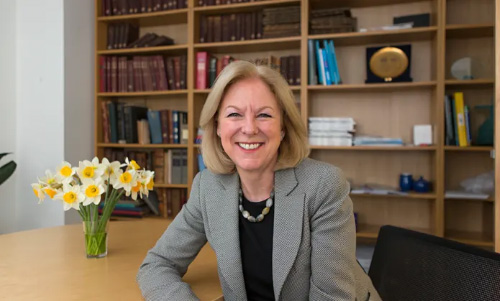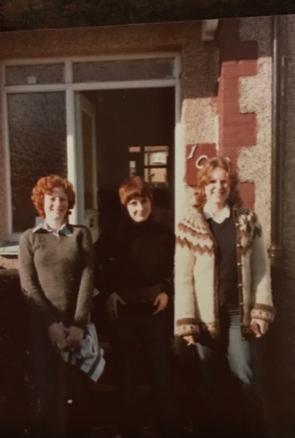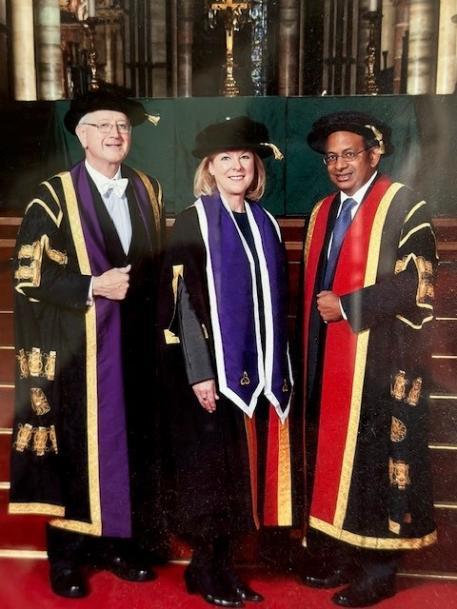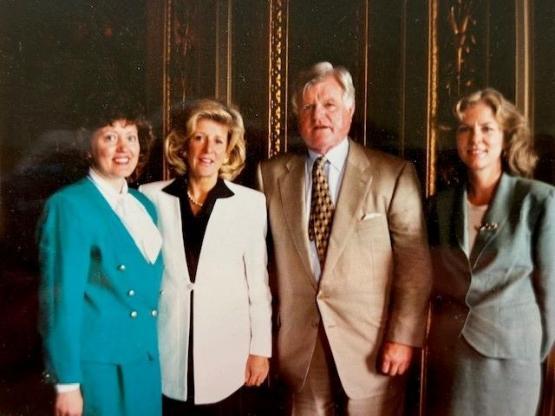Shirley Cramer CBE
BA Applied Social Studies - 1978
- Former CEO of Royal Society for Public Health
- Non Executive Director of Food, Farming and Countryside Commission
- 20 years leadership experience within the voluntary sector in the USA and UK and as a management and development consultant

Given that it is nearly 50 years since I graduated, it's extraordinary that I still have more than 20 close friends from my student days. Next year we will be having our 50-year course reunion.
Journey to Bradford
"I chose to study at Bradford from 1974-78 as it had the best social work course in the country at that time and combined at BA ( Hons) with a CQSW which after 4 years meant that you could work in the public sector as a social worker.
"I had a very happy time at Bradford and my favourite memories all relate to making friends, dancing and eating curries at least 3 times a week. I also went to my first Panto as a student at the famous Alhambra."

Shirley during her time as a student at the University in 1978
Career journey
"After graduating from Bradford, I went to work for Ealing Social Services as a Social Worker and was based in Southall area office. I worked as an emergency SW for 3 years before moving to New York.
"I was married in 1979 and my husband was offered a job in New York and so we moved there in 1982. I was fortunate to be accepted for a Master’s degree at Columbia University in Social Administration, which essentially was management of the public and voluntary sectors and public policy. I then worked for a few years in various roles for a not profit, Settlement House which gave me a grounding in programme planning, fundraising and management.
"My husband and I then moved back to London in 1986 where I became head of fundraising for a National Charity, then after I had my first child, I moved into Development Consulting, which was fascinating and offered much flexibility.
"In the early 1990’s we moved back to NYC (my husband had been offered another role there) where I took on my first Chief Executive role at the National Centre for Learning Disabilities. In this job, I worked closely with the first Clinton Administration and contributed to the No Child Left Behind legislation. In the mid 1990’s , we moved to Cleveland, Ohio where I had a consultancy role and took on my first non -executive roles, as a board member of both a children’s hospital and a Special School.
"We moved back to London in 2000, where I became CEO of Dyslexia Action which at the time had 500 staff and regional offices. I also became a board member of the national Learning and Skills Council. In 2011, I was interim CEO of Alzheimer’s Research UK and later became a trustee. I have been fortunate to see it grow from a £5m to a £50 million organisation in that time. My final full time CEO role was at the Royal Society for Public Health ( RSPH) where I found that my degree from Bradford was particularly relevant in relation to the social determinants of health. In this role, I served on various Government committees and gave evidence at numerous Select Committees.
"At the current time I am a National Food, Farming and Countryside Commissioner and trustee which is bringing together farming, the environment, land use, food and health into a coherent policy. I am chair of the Rare Dementia Support Groups at University College London and a trustee of Help for Heroes as well as ARUK."

Shirley received her Master's degree in Social Administration from Columbia University, in the City of New York.
Career highlights
"The biggest successes of my career are where I have had some influence in improving public policy. In Washington DC in 1993 we held a National Summit on Learning Disabilities which prompted the No Child Left Behind Act, federal legislation which ensured children with learning differences were included and supported in the mainstream classroom.
"At RSPH, we created numerous reports aimed at changing/improving Government policy on a variety of traditional public health issues and emerging ones. I am particularly proud of our initial reports on Gambling, Debt and ‘health on the high street’, which evidenced poverty and disadvantage as the biggest risk factors in a healthy life."

Shirley pictured with the former Senator of the United States Edward Kennedy and senior colleagues, taken in Washington DC. This was during Shirley's time as CEO of NCLD in New York City.
Shirley's advice for women in leadership
As a woman with over 25 years of leadership experience in your career, what do you see as some of the biggest challenges facing female leaders today?
"One of the biggest challenges for females is being considered for the top position. It is still harder for women to get to this level and we know that the pipeline for women leaders is not improving as quickly as it should. The cost and accessibility of appropriate childcare is still a barrier to many women as is culture and flexibility."
What do you think organisations can do to support the future of diverse leadership and encourage more women to take on leadership roles?
"I think that having good mentors in an organisation (or externally) can really help women consider their potential and help them build confidence. Giving women and other diverse leaders the opportunity within organisations to do different roles, serve on specific task groups and be given media or presentation experience. Flexibility and childcare are essential."
What tips would you give to other women looking to follow in your footsteps if they are looking to climb the corporate ladder and have a career in Leadership roles?
"I do think that women are often not confident in their own abilities and mentors or others in the organisation need to help develop self-confidence. Women also need to know that it's fine to fail as this is often where you learn the most. This is something I learned working in the USA.
You also don’t have to be perfect at everything but you do need to be authentic and be good at listening to people at all levels of the organisation. This is a skill I learned as a Social Worker and it has been critical in my leadership style. Get to know people in different sectors as you can learn a lot from tailoring ideas from various sectors."
